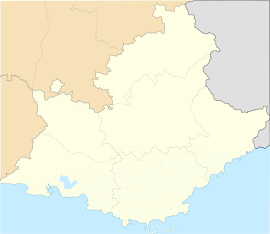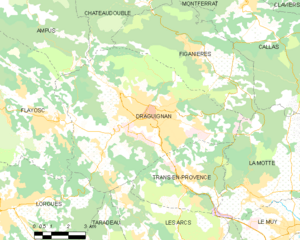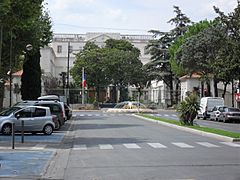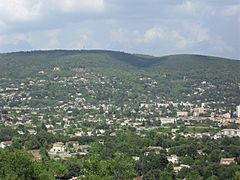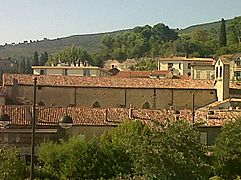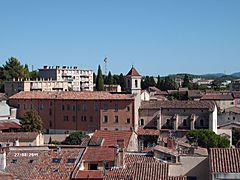Draguignan facts for kids
Quick facts for kids
Draguignan
|
||
|---|---|---|
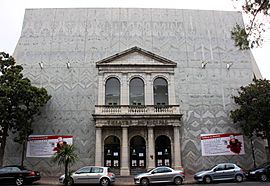
City theater, Draguignan
|
||
|
||
| Country | France | |
| Region | Provence-Alpes-Côte d'Azur | |
| Department | Var | |
| Arrondissement | Draguignan | |
| Canton | Draguignan | |
| Intercommunality | Draguignan | |
| Area
1
|
53.8 km2 (20.8 sq mi) | |
| Population
(2013)
|
39,174 | |
| • Density | 728.1/km2 (1,885.9/sq mi) | |
| Demonym(s) | Dracénois | |
| Time zone | UTC+01:00 (CET) | |
| • Summer (DST) | UTC+02:00 (CEST) | |
| INSEE/Postal code |
83050 /83300
|
|
| Elevation | 153–603 m (502–1,978 ft) (avg. 376 m or 1,234 ft) |
|
| Website | www.ville-draguignan.fr/ | |
| 1 French Land Register data, which excludes lakes, ponds, glaciers > 1 km2 (0.386 sq mi or 247 acres) and river estuaries. | ||
Draguignan (Occitan: Draguinhan) is a town in southeastern France. It is located in the Var area, which is part of the Provence-Alpes-Côte d'Azur region. Draguignan is an important administrative center for the Var department.
Contents
History of Draguignan
Draguignan became the main administrative city, called a prefecture, for the Var area in 1797. This happened at the start of the French Revolution. Even though it wasn't the biggest city, it held this important role for a long time. Draguignan remained the prefecture until 1974. After that, the main administrative office was moved to Toulon.
Geography of Draguignan
Draguignan is nestled at the base of the Malmont mountain. The city sits in a valley that stretches about 2 kilometers (1.2 miles) long. The Nartuby, a small river that flows into the Argens river, runs to the west of the city.
The total area of Draguignan is about 53.8 square kilometers (20.8 square miles). The average height above sea level for the city is 376 meters (1,234 feet). Right at the city hall, the height is around 200 meters (656 feet).
Draguignan is surrounded by several other towns. These include Figanières to the north and northeast, Trans-en-Provence to the east and southeast, and Les Arcs and La Motte to the south. To the west, you'll find Flayosc, and to the northwest are Ampus and Châteaudouble.
Climate in Draguignan
Draguignan has a Mediterranean climate. This means it usually has warm, dry summers and mild, wet winters. This type of climate is often called "Csb" in the Köppen climate classification system.
Population of Draguignan
In 2013, Draguignan had a population of 39,174 people. This means that about 728 people live in each square kilometer of the city's area.
People who live in Draguignan are called Dracenois in French. If you are talking about a woman from Draguignan, you would call her a Dracenoise.
Sister Cities of Draguignan
Draguignan has a special friendship with another city. This is called a "sister city" relationship.
Gallery
-
The Chapelle des Minimes and its convent in Draguignan
Related pages
Images for kids
See also
 In Spanish: Draguignan para niños
In Spanish: Draguignan para niños
 | Kyle Baker |
 | Joseph Yoakum |
 | Laura Wheeler Waring |
 | Henry Ossawa Tanner |




